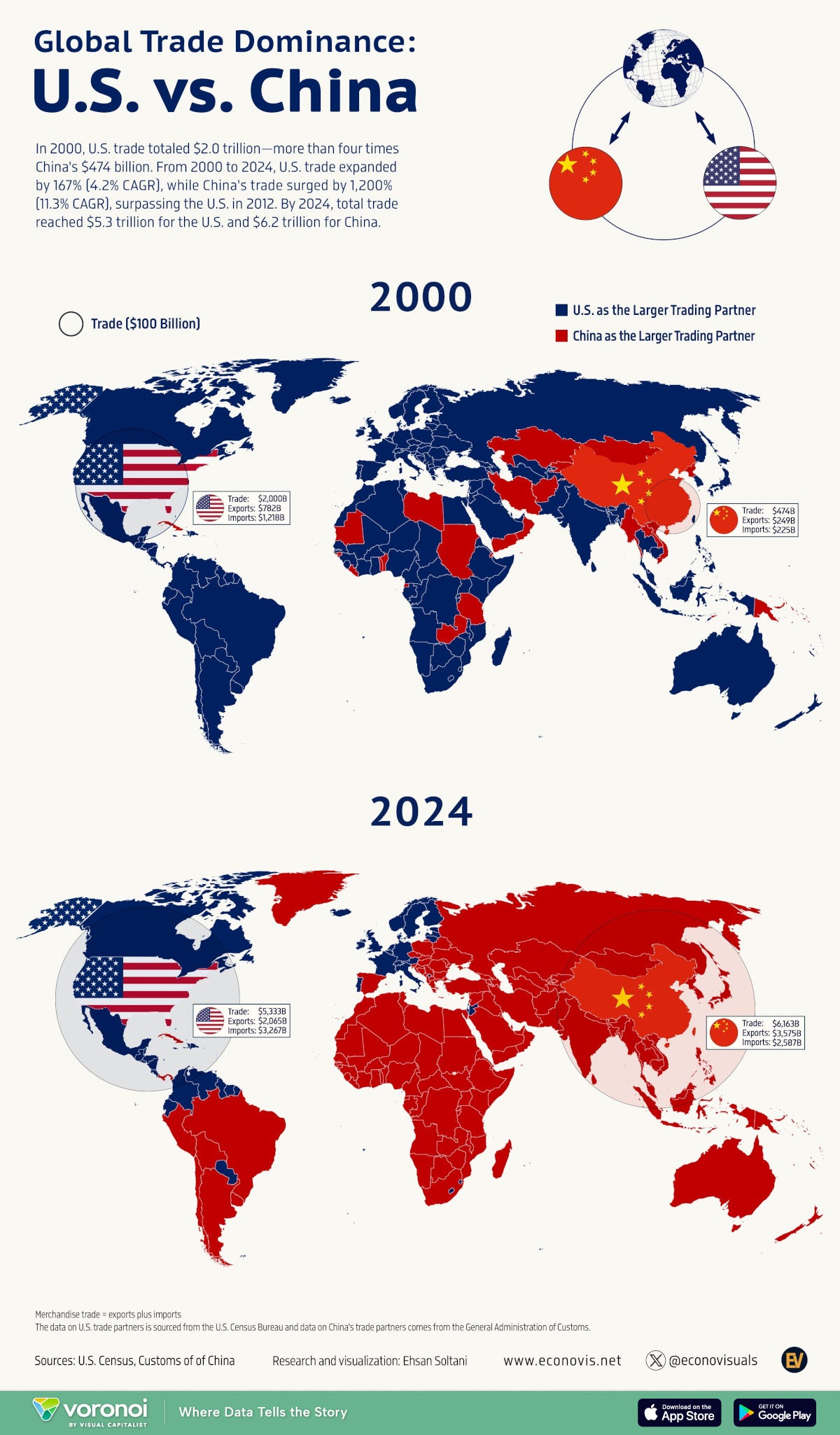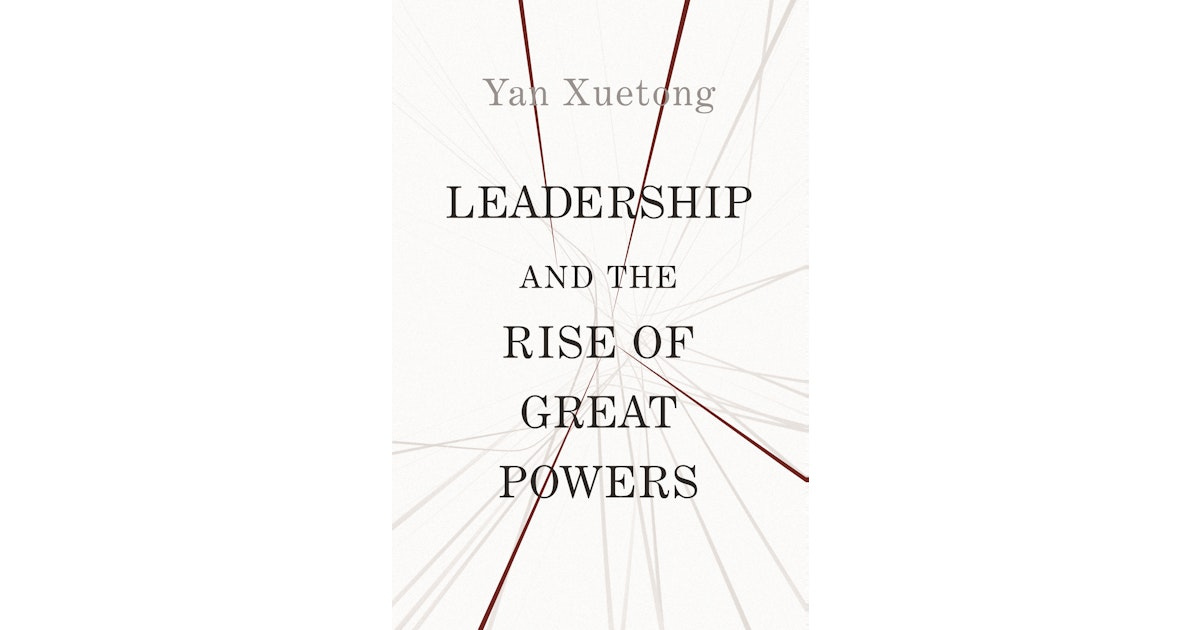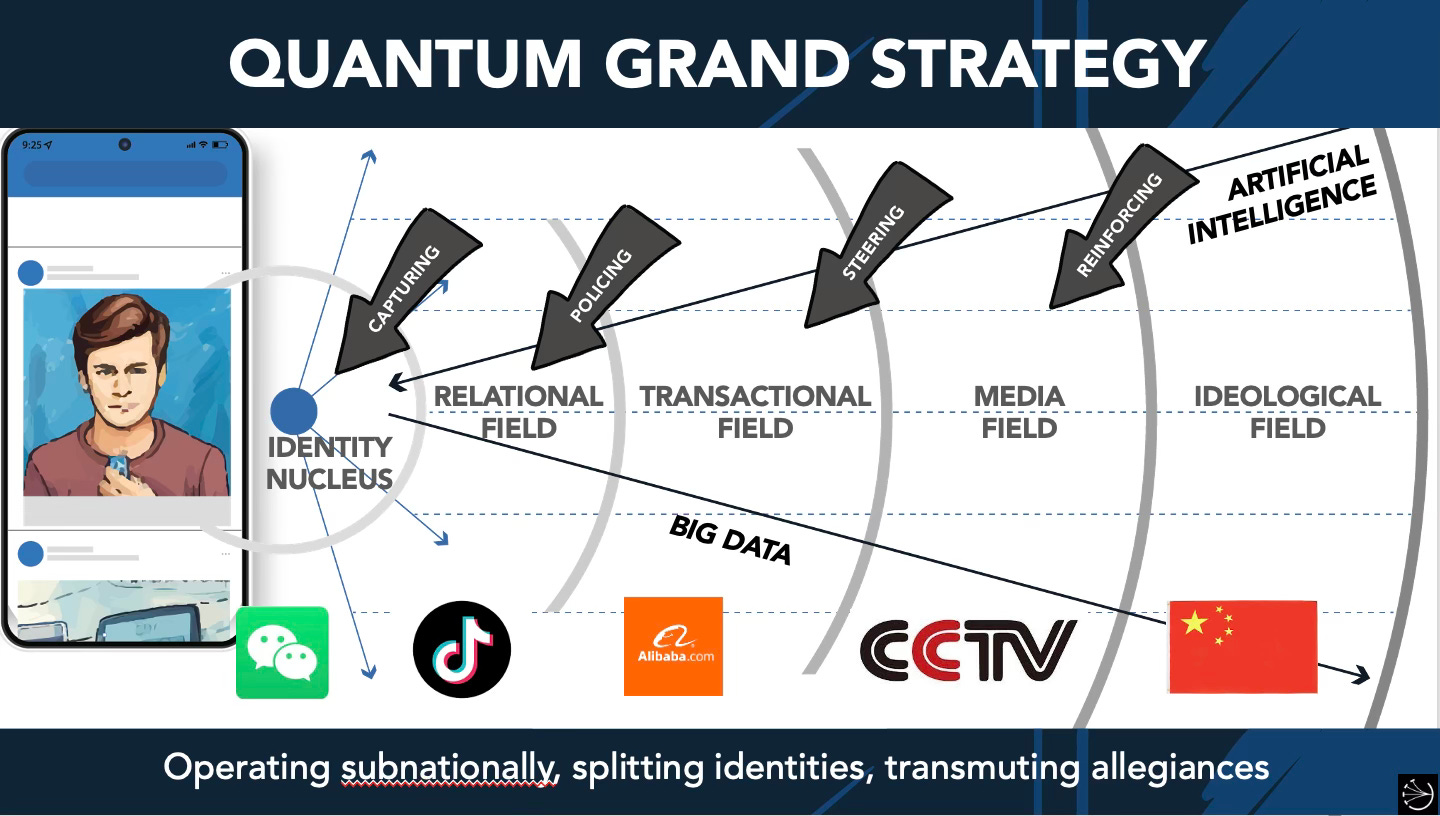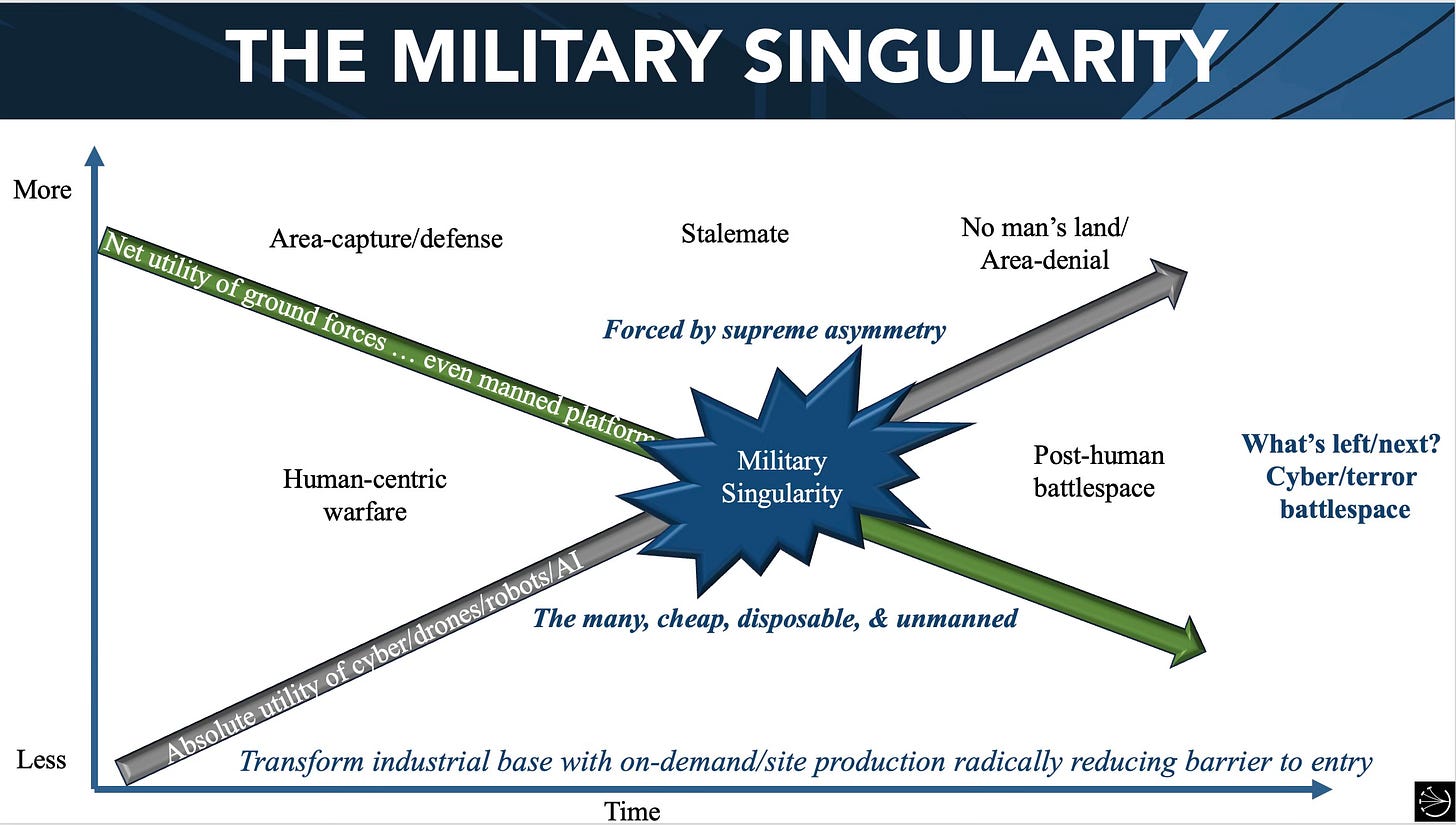[POST] The most direct path to the AI promised land
The fox frets over defense and arms races, while the hedgehog burrows ahead on basic infrastructure and water/power management
This is a reader-supported publication. I give it all away for free but could really use your support if you want me to keep doing this.
We all recognize the same promised land: pervasively sensored environments comprising an Internet of Things (IoT) that yields the big data that, in turn, produces the AIoT which allows for omniveillance by the constituted authorities (see talk of the Great Fusing between tech giants and the state) that results in a new form of sub-national security meshing public safety with consumer safety to create a sense of profound personal safety for all citizens — at the price, of course, of privacy..
From America’s New Map:
There is both opportunity and danger along this path. The global middle class will not be satisfied with defense, as they fear interstate war less than civil strife. Commensurate with risk shifting to the individual, the global middle class desires and values security as a permanent condition within which the assets that define wealth accumulation (e.g., cars, houses, land, education, savings) can be protected and preserved while appreciating in value. In coming decades, their political allegiance to the quintet of competing Northern superpowers will be determined on this fundamental point: Who supplies superior security?
Defense (or sheer military power) gets America into that game, but it will be our ability to export security (via technologies, platforms, services, and expertise), in competition with the four other superpowers, that determines which states’ loyal subscriptions are won or lost. A glimpse of this future: America’s National Geospatial-Intelligence Agency (NGA)—a Department of Defense combat support element—increasingly fielding requests from the Federal Emergency Management Agency (FEMA) to divert their powerful satellite-based reconnaissance systems from monitoring, for example, North Korean nuclear sites to locating hurricane victims. That repurposing of defense assets to security purposes will become commonplace as climate change’s system-shaping impact supersedes the dynamics of superpower military rivalries. In the end, defense is necessary but insufficient to winning this global competition for affiliation, the outcome of which will be measured in member states accrued—the geopolitics of belonging.
The danger here is that George Orwell’s predicted dystopia of fascism growing into a surveillance state—or vice versa—seems timelier than ever. Security is increasingly achieved within and across borders through the state’s surveillance (observing behaviors and communication) and “dataveillance” (analysis of database records). According to noted security expert Kim Taipale, this post-9/11 global phenomenon gives rise to “omniveillance,” or the constant monitoring of all human activity by both public authorities and—per the “know your customer” ruleset—the private sector, which is already highly incentivized to do so solely for push-marketing purposes. It is within this omniveillance dynamic that we spot the fusion of global middle-class consumer and political desires for stability. The merger of these “confidence” requirements cannot be met solely by the North’s traditional military alliances.
As this era’s globalization is vertically consolidated along South-North lines, security increasingly displaces defense. Security leverages surveillance, and effective surveillance depends on access and sensors, the most important of which is a smartphone—the modern data chokepoint blending consumer activity with personal security. Those who own the sensors determine the access. That is the nature of the security competition now underway among our five superpowers, where Apple versus Huawei is a more compelling throughline than US Navy carriers versus China’s carrier-killer missiles.
These superpower brand wars are well underway.
The real competition with China is not over Taiwan, and those who attach our nation’s reputation and standing to that singular potential conflict will be judged by history as merely viewing war within the context of war instead of within the context of everything else — the latter being far better captured by the notion of America’s AI operating system (AIOS) battling China’s AIOS for global supremacy, here being defined as the sum economic capacity (production and consumption) of our global market alliance versus yours.
China is betting it can capture far more of the world than the US and there is good reason to believe it can for the simple reason that China’s trade with the bulk of the world’s nations outpaces ours.
That is a stunning and highly advantageous opportunity afforded China in the years ahead. If you are choosing between two AIOSs, don’t you naturally want to go with the one who’s already meeting more of your needs across the board — the superpower with whom your economic fate is more intertwined?
Of course you do … unless there are overriding political determinants to your thinking.
China, under Xi, strikes the world as a far more stable and reasonable partner than America does now under Trump.
From ANM, we need to understand that the Chinese have honed in on this advantage and see it clearly as their path to market-making status within a global order of their defining:
For a longer-term expression of Beijing’s ongoing effort to revise global rules, we turn to Yan Xuetong—dean of Tsinghua University’s Institute of International Relations—and his 2019 book, Leadership and the Rise of Great Powers. In it, Yan proposes a rising China can overtake far wealthier (per capita) America as the world’s dominant power. His highly Confucian argument: superior national leadership projecting superior moral authority abroad. By efficiently ruling at home through progressive reforms, Beijing’s leaders have, in his estimation, closed the power gap with America.
But what closed that gap even more, in Yan’s analysis, has been the inferior quality of America’s political leadership, specifically their inability to effect necessary domestic reforms. Hard to argue there.
Thus, China’s growing advantage in political leadership capability gives it greater “strategic credibility” as a global leader. While American political leadership yo-yos between withdrawal (Barack Obama, Joe Biden), aggression (George W. Bush), and erratic untrustworthiness (Donald Trump), Beijing’s current ruler, Xi Jinping, appears a paragon of stable progress. Per this logic, Xi’s deep embrace of dictatorship is excusable as a necessary means to those greater ends of stability and credibility.
Understand: Trump’s primary appeal comes from his aggressive marketing of fear of the future. His fantastic promises of a “golden age” are but one side of his coin, the other being that we’re doomed to live in a violent hellscape were his rule to be thwarted (or maybe just ended or maybe just timed-out).
Simply put, the man rules by fear — there is no arguing that point.
Fear of the future is not a great sale generally, for this reason (from ANM):
Any just society—and the world for that matter—wants its population concentrated in the middle economic ranks, minimizing the special interests of both poor and rich. The poor naturally seek protection from their circumstances, while the rich want protection from the poor (e.g., crime, tax burden). The middle class, however, wants something far more complicated and difficult to deliver—namely, protection from the future. The middle class, having achieved or long enjoyed a good life, wants to pass it along intact to their children, meaning their kids start adulthood with better prospects and earning potential than they had. Mess with the middle class on that score and you put your nation—and most certainly any democracy—at serious risk of sliding into intolerance, cruelty, xenophobia, isolationism, and even civil strife.
We today present to the world a vision of America coming apart over its shrinking middle class — headed for civil strife and even war. That’s the vibe we give off.
China gives off no such vibe, even as its potential for civil war, I would argue, is greater than ours.
But that’s the advantage of autocracies: they are good at promoting their strengths and hiding their weaknesses, whereas democracies are the opposite — keen to tell you all about their problems and self-deprecating as to their strengths. Over the long run, that nature of democracies prevails because it is far better at self-improvement than autocracies. Problem is, we don’t live in the long run (h/t John Maynard Keynes); we live in the here and now.
Democracies beat autocracies in overall economic performance because they are more sensitive to the needs of the middle class. The problem is, when a democracy’s middle class is unhappy, then nobody is happy. That’s where the US is today and that’s what we project to the world.
China, again, presents a better picture and offers the Global South easier and faster terms for global connectivity through its Belt and Road Initiative (BRI), to include its follow-on sales of network surveillance technologies (Smart/Safe Cities).
Now, the US political establishment is finally waking up to THAT contest — that networking-leading-to-big-data-leading-to-AI-development-leading-to-network-centrality. Future superpower spheres of influence will not based on military alliances or even trade volume (although the latter is likely to match) but on those superpowers’ achievement of network centrality within nations and across regions — basically, do you rely on China’s AIOS or America’s AIOS?
Whomever you rely on most will be your hand-in-glove partner on sub-national security (policing, in old terms) in addition to your hand-in-glove partner on consumerism and information spheres … basically what I describe as China’s quantum grand strategy.
So, where does national cyber sovereignty come in?
It comes in as the negotiating stance of smaller powers vis-a-vis greater ones seeking to secure that network centrality: to prevail in my market/nation, you must agree to the following …
An example of the following …
FOREIGN POLICY: The Next AI Debate Is About Geopolitics; Data might be the “new oil,” but nations—not nature—will decide where to build data centers.
Where industrial revolutions happen can reshape global affairs.
Britain’s Industrial Revolution made London the center of an empire upon which the sun never set. The digital age took off in Silicon Valley, making the United States home to world-leading technology companies. But if AI leads to the next industrial revolution, that revolution will have been global from the beginning. And in the most chaotic period in world affairs since at least the Cold War, building the infrastructure to sustain the AI revolution is a geopolitical test that companies and countries alike will need to pass.
AI is a general-purpose technology. But unlike previous general-purpose technologies, such as electricity or steam engines, AI-enabled tools proliferated so quickly that cutting-edge innovations became widely available almost overnight, in the form of chatbots, image generators, and—increasingly—virtual co-pilots. The AI industry also depends on a network of global commercial partners, including not only U.S. and Chinese technologies, but also Taiwan’s semiconductor fabrication plants, extreme ultraviolet lithography machines made in the Netherlands, and other critical supply chain inputs. Competition over AI has so far been dominated by debates about leading-edge semiconductors, but the next phase is also about geography and power. Specifically, where can the data centers that power AI workloads be built? And who has the capital, energy, and infrastructure needed to power the data centers where AI workloads run?
Does that now make more clear in your mind what China’s BRI advantage is really all about?
The future of AI is chip production and data centers and, guess what? Both require vast sums of power and water to operate, meaning the management of power and water becomes the most logical entry point to network centrality — as in, they who manage the water and power best are best positioned to promulgate their version of an AIOS.
We in the US assume that the most logical vector toward that promised land is national defense when it is really all about natural resources and power generation done well — or at least better than the competition.
The national security signals are all there: we’re already in the era of hydro politics and those tension points will only grow more severe with climate change altering global precipitation patterns.
Sure, the force of globalization’s digitalization will superficially appear centered in the Military Singularity currently underway.
And so we assume companies like “scary” Palantir represent the clear path forward.
But, the truth is, such companies, focused on national defense, are more about closing the door on the past than in opening the door to the future, and they will remain in that mode for quite some time as the world learns — on one helluva steep curve — what it means to live with AI permeating our lives.
The ground-floor pathway, however, remains in the realm of water and power management. That’s the hedgehog path compared to Palantir’s fox path.
Isaiah Berlin’s essay leverages the ancient Greek saying: “The fox knows many things, but the hedgehog knows one big thing.” Berlin uses this to classify thinkers and strategies:
Hedgehogs are guided by a single, central vision or organizing principle.
Foxes draw upon a wide variety of experiences and strategies.
Water and power management as a path to AI dominance fits the hedgehog archetype:
Control and optimization of critical infrastructure are foundational for societal stability, economic growth, and technological advancement. Mastery here underpins AI’s transformative impact.
Generative AI and predictive analytics revolutionize water and power utilities, enabling real-time monitoring, leak detection, demand forecasting, and energy optimization.
Whoever dominates these essential systems can shape the future of cities, agriculture, industry, and even geopolitics.
National security, by contrast, exemplifies the “fox” approach:
National security requires constant adaptation to evolving threats and technologies.
Security experts must anticipate a supremely wide range of scenarios.
These seemingly limitless requirements push these “foxes” toward the equally scary goal of total information awareness (once focused on terrorists, now resurrected for illegal migrants).
As a rule and by instinct, I favor the fox approach, but I am seeing the logic of the FP article here, because it allows for nation states to assert their sovereignty in this great global AI-build out, and that Southern sovereignty is crucial to steering North-South integration toward a sustainable and just pathway.
Otherwise, charges of digital colonization will surface and poison the atmosphere of cooperation needed. To me, that is the greater fear, followed by China’s lead in achieving network centrality across the Global South.
Compared to those two, Taiwan is a mole hill not worth dying on.












